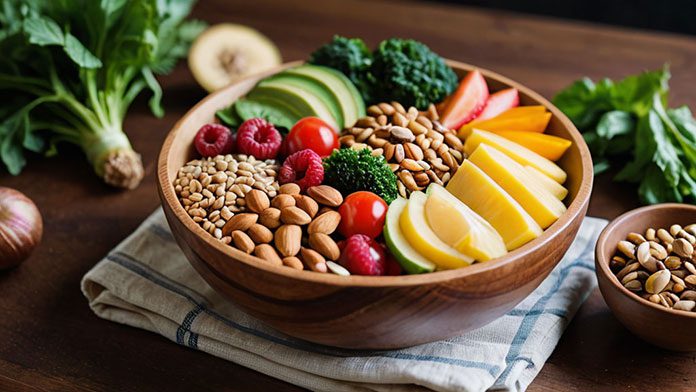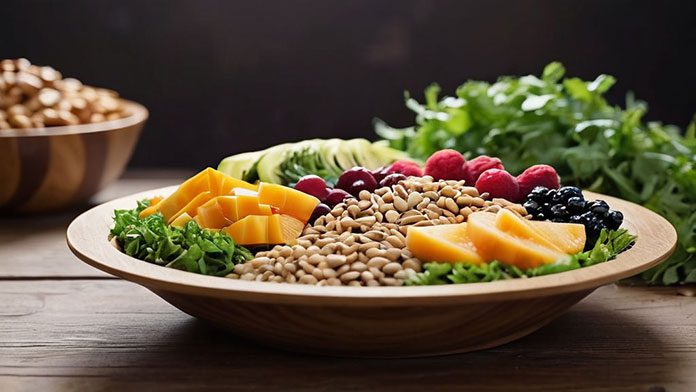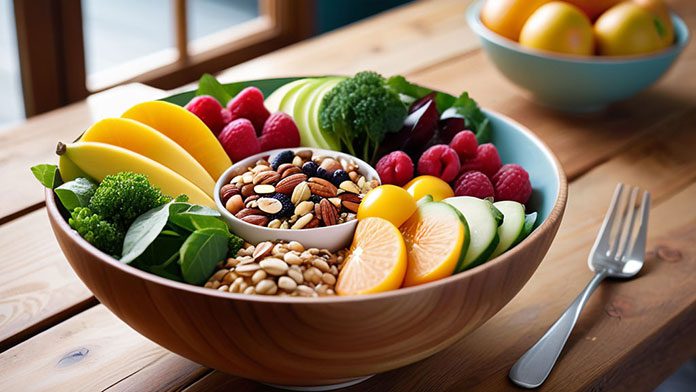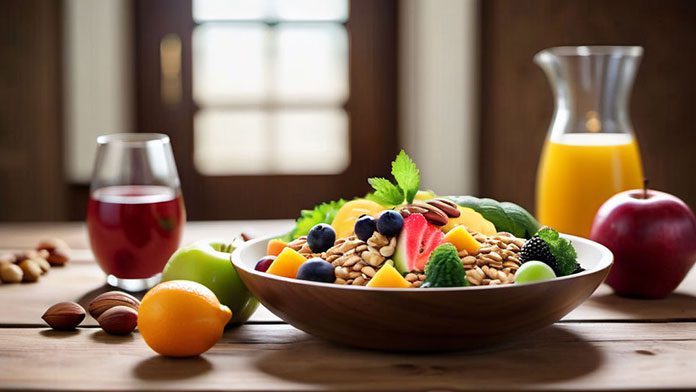Are you feeling stressed, anxious, or struggling to focus?
Unlock the power of your mind with these 7 nutrient-packed foods!
Dive into a vibrant world of leafy greens, fatty fish, berries, nuts and seeds, whole grains, dark chocolate, and fermented foods.
These delicious options have been linked to enhanced mental health, providing you with the nutrients your brain craves.
So why wait? Let’s embark on this delectable journey towards a healthier mind!
Table of Contents

Related Video: "10 Incredible Foods for your Brain & Mental Health | Brain Food | Mental Health | Depression" by Medinaz
Main Points
– Leafy greens, fatty fish, berries, nuts and seeds, whole grains, dark chocolate, and fermented foods are all nutritious foods that can enhance mental health.
– Leafy greens are rich in folate and antioxidants, which support neurotransmitter production and protect the brain from oxidative stress.
– Fatty fish provide omega-3 fatty acids that reduce inflammation, improve cognitive function, and regulate mood.
– Berries are packed with antioxidants that protect the brain from oxidative stress and inflammation, improving memory and cognitive function.
Leafy Greens

Include leafy greens in your diet for improved mental health.
Leafy greens, such as spinach, kale, and Swiss chard, are packed with essential nutrients that have been shown to positively impact mental well-being. These vibrant greens are rich in folate, a B-vitamin that plays a crucial role in the production of neurotransmitters like serotonin and dopamine, which are responsible for regulating mood and emotions. Studies have found that low levels of folate are associated with an increased risk of depression and cognitive decline. By incorporating leafy greens into your meals, you can ensure you’re getting an adequate amount of this vital nutrient.
Furthermore, leafy greens are an excellent source of antioxidants, including vitamin C and E, which help protect the brain from oxidative stress. Oxidative stress is linked to the development of mental health disorders such as anxiety and depression. Consuming leafy greens regularly can help combat oxidative stress and promote overall brain health.
Additionally, these greens are a great source of fiber, which aids in maintaining a healthy gut microbiome. Emerging research suggests that the gut microbiome plays a significant role in mental health, influencing mood regulation and cognitive function. Including leafy greens in your diet can support a healthy gut and potentially improve mental well-being.
To reap the benefits of leafy greens, consider adding them to your salads, smoothies, or sauté them as a side dish. By incorporating these nutritious greens into your meals, you can contribute to improved mental health and overall well-being.
Fatty Fish

To further support your mental well-being, incorporating fatty fish into your diet on a regular basis is highly recommended. Fatty fish, such as salmon, trout, and sardines, are rich in omega-3 fatty acids, which play a crucial role in brain health. Research has shown that omega-3 fatty acids have numerous benefits for the brain.
Omega-3 fatty acids are known to reduce inflammation in the brain, which can help protect against mental health disorders such as depression and anxiety. In addition, they’ve been found to improve cognitive function and memory. Studies have shown that people who consume fatty fish regularly have a lower risk of developing age-related cognitive decline and Alzheimer’s disease.
Furthermore, omega-3 fatty acids have been shown to help regulate neurotransmitters in the brain, such as dopamine and serotonin, which are involved in mood regulation. By increasing the levels of these neurotransmitters, fatty fish can help improve your mood and overall mental well-being.
To reap the brain health benefits of fatty fish, aim to include it in your diet at least twice a week. You can try grilled salmon, baked trout, or canned sardines in salads or sandwiches. If you’re not a fan of fish, consider taking omega-3 supplements, although it’s always best to get nutrients from food sources whenever possible.
Berries

Berries aren’t just delicious fruits; they’re also packed with numerous benefits for your brain. Research suggests that berries, such as blueberries, blackberries, and strawberries, are rich in antioxidants and other compounds that can help improve cognitive function and protect against age-related brain decline.
Including a variety of berries in your diet can provide you with the best cognitive benefits, so grab a handful of these nutritious fruits to boost your mental health.
Berry Benefits for Brain
Boost your brainpower by incorporating berries into your daily diet. Blueberries, in particular, have been found to have cognitive benefits. They’re rich in antioxidants, which help protect the brain from oxidative stress and inflammation. Studies have shown that consuming blueberries regularly can improve memory and cognitive function, especially in older adults.
The antioxidants in strawberries also contribute to brain health. They help reduce oxidative damage and inflammation in the brain, which can improve cognitive function and delay age-related decline.
Including a variety of berries in your diet, such as blueberries and strawberries, can provide your brain with essential nutrients and antioxidants that support optimal brain function.
Best Berries for Cognition
Incorporating a variety of berries into your daily diet can significantly enhance cognition and brain health. Berries aren’t only delicious, but they’re also packed with nutrients that promote optimal brain function.
Among the different types of berries, blueberries stand out for their exceptional cognitive benefits. Blueberries are rich in antioxidants and compounds called flavonoids, which have been shown to improve memory and cognitive function. They also contain anthocyanins, which have anti-inflammatory effects and protect the brain from oxidative stress.
To reap the cognitive benefits of blueberries, try incorporating them into your diet through brain-boosting smoothie recipes or simply enjoy them as a snack. Remember to choose organic berries whenever possible to minimize exposure to pesticides.
Nuts and Seeds

Let’s talk about the benefits of including nuts and seeds in your diet for enhanced mental health.
Not only are they a great source of omega-3 fatty acids, which have been shown to improve brain function and reduce symptoms of depression and anxiety, but they also provide a variety of antioxidants that help protect your brain cells from damage.
Remember to practice portion control as nuts and seeds are high in calories, and try to incorporate a variety of options like almonds, walnuts, chia seeds, and flaxseeds to maximize the nutritional benefits.
Omega-3 Benefits and Sources
To improve your mental health, include nuts and seeds in your diet as they provide essential omega-3 fatty acids. Omega-3 fatty acids are crucial for brain health and have been shown to improve mood and reduce symptoms of depression and anxiety.
While omega-3 supplements are available, it’s always best to get your nutrients from whole foods. Fortunately, there are plenty of vegetarian sources of omega-3 fatty acids found in nuts and seeds. Walnuts, flaxseeds, chia seeds, and hemp seeds are all excellent sources.
Incorporating these into your diet can help boost your intake of omega-3s and support your mental well-being. Try adding them to your morning oatmeal, smoothies, or salads for a nutritious and delicious way to enhance your mental health.
Antioxidant-Rich Options Available
Include antioxidant-rich nuts and seeds in your diet to further enhance your mental health. Nuts and seeds aren’t only a tasty snack but also packed with antioxidants that can benefit your overall health.
Antioxidants are compounds that help protect your body’s cells from damage caused by harmful free radicals. They play a crucial role in reducing inflammation and oxidative stress, which are known to contribute to mental health issues such as depression and anxiety.
Incorporating nuts and seeds into your diet can be as simple as adding them to your morning smoothie or sprinkling them on top of your salads. Some antioxidant-rich smoothie recipes include almond and blueberry smoothie or chia seed and spinach smoothie.
Portion Control and Variety
To maintain a balanced diet and ensure optimal mental health, it’s important to practice portion control and incorporate a variety of nuts and seeds into your meals and snacks. Nuts and seeds are packed with essential nutrients, including healthy fats, protein, fiber, vitamins, and minerals.
Here are some tips for portion control and incorporating nuts and seeds into your diet:
– Measure your portions: Use measuring cups or a food scale to portion out your nuts and seeds. This will help you avoid overeating and ensure you’re getting the right amount of nutrients.
– Mix it up: Try different types of nuts and seeds to add variety to your diet. Almonds, walnuts, chia seeds, and flaxseeds are all great options.
– Use them as toppings: Sprinkle nuts and seeds on top of salads, yogurt, or oatmeal for added crunch and nutrition.
Whole Grains
Incorporate whole grains into your diet to boost your mental health and well-being. Whole grains are packed with nutrients that are essential for brain function and can have numerous benefits for your mental health.
Firstly, whole grains are a great source of fiber, which helps regulate blood sugar levels and keeps you feeling full and satisfied. This can help stabilize your mood and prevent energy crashes throughout the day.
Additionally, whole grains are rich in B vitamins, which play a crucial role in brain health. These vitamins help produce neurotransmitters that regulate mood, such as serotonin and dopamine.
Including whole grains in your diet isn’t only beneficial for your mental health but can also be delicious and versatile. There are plenty of whole grain recipes available that can easily be incorporated into your meals.
For breakfast, you can enjoy a bowl of oatmeal topped with fresh fruits and nuts. For lunch, try a quinoa salad with vegetables and a lean protein. And for dinner, swap out white rice for brown rice or experiment with other whole grains like farro or barley. These recipes won’t only provide you with the mental health benefits of whole grains but also ensure that your meals are nutritious and satisfying.
Incorporating whole grains into your diet is a simple yet effective way to support your mental health. By enjoying a variety of whole grain foods, you can boost your brain function, stabilize your mood, and enhance your overall well-being.
Dark Chocolate
Enjoy the benefits of dark chocolate by adding this delicious treat to your diet in moderate amounts. Dark chocolate has been found to have several positive effects on mood and cognition, making it a great addition to your mental health routine. Here are three reasons why dark chocolate can be beneficial for your overall well-being:
– Dark chocolate contains flavonoids, which are natural compounds that have antioxidant properties. These flavonoids have been shown to improve blood flow to the brain, enhance cognitive function, and boost mood. By increasing blood flow, dark chocolate helps deliver more oxygen and nutrients to the brain, leading to improved cognitive performance.
– Dark chocolate also contains a small amount of caffeine, which can increase alertness and improve focus. Caffeine stimulates the central nervous system and enhances the release of neurotransmitters like dopamine and norepinephrine, which are associated with improved mood and motivation.
– Another key component of dark chocolate is magnesium. Magnesium plays a crucial role in regulating neurotransmitters and has been linked to better brain function and lower risk of depression. Consuming dark chocolate can help increase your magnesium intake and support a healthy mood.
Incorporating moderate amounts of dark chocolate into your diet can have a positive impact on your mental health by improving mood and cognition. Remember to choose dark chocolate with a high cocoa content and consume it in moderation as part of a balanced diet.
Fermented Foods
Continue to boost your mental health by incorporating fermented foods into your diet. Fermented foods aren’t only delicious but also offer numerous benefits for your gut health and overall well-being.
These foods go through a natural fermentation process, where beneficial bacteria and yeasts convert sugars into alcohol or acids. This process not only enhances the flavor but also increases the nutritional value of the food.
Fermented foods are rich in probiotics, which are beneficial bacteria that promote a healthy gut. The gut-brain connection is well-established, and a healthy gut is essential for optimal mental health. Probiotics help to balance the gut microbiome by increasing the number of good bacteria and reducing harmful bacteria. This balance is crucial for proper digestion, nutrient absorption, and the production of neurotransmitters like serotonin, which plays a vital role in mood regulation.
Some popular fermented foods include sauerkraut, kimchi, kefir, yogurt, and kombucha. These foods aren’t only packed with probiotics but also provide essential vitamins, minerals, and antioxidants. Including fermented foods in your diet can improve digestion, boost your immune system, and may even reduce symptoms of anxiety and depression.
To incorporate fermented foods into your diet, start by adding a small serving to your meals a few times a week. You can enjoy sauerkraut as a side dish, add kimchi to your stir-fries, or enjoy a glass of kefir or kombucha as a refreshing beverage. Experiment with different fermented foods to find the ones you enjoy the most and make them a regular part of your diet for enhanced mental health.
Frequently Asked Questions
How Do Leafy Greens Contribute to Enhanced Mental Health?
Leafy greens like spinach and kale contribute to enhanced mental health by providing important nutrients like folate and vitamin K. These nutrients support brain function and help regulate mood, leading to improved mental well-being.
What Are the Best Types of Fatty Fish for Boosting Mental Health?
You'll be hooked on the benefits of fatty fish for your mental health! When it comes to boosting your brain, opt for wild caught fish over farmed. The omega-3 fatty acids in wild caught fish promote brain health.
How Do Berries Positively Impact Mental Health?
Eating berries can positively impact your mental health. They are rich in antioxidants, which play a vital role in promoting mental well-being. Try incorporating berries into your diet for a natural boost.


